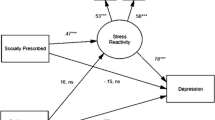Abstract
The present study examined perfectionism and general coping ability as assessed by a new measure of constructive thinking. A sample of 77 students completed the Multidimensional Perfectionism Scale (MPS) and the Constructive Thinking Inventory (CTI). The MPS provides measures of selforiented, other-oriented, and socially prescribed perfectionism, while the CTI provides various measures, including summary scores of global constructive thinking, emotional coping, behavioral coping, categorical thinking, personal superstitious thinking, naive optimism, and esoteric thinking. Subjects also completed a measure of depressive symptoms so that we could examine perfectionism and coping independent of current levels of adjustment. The main finding was that socially prescribed perfectionism was associated with less constructive thinking and more negative coping across most of the CTI subscales, and these associations remained significant after removing variance due to levels of depression symptoms. Self-oriented perfectionism was adaptive in that it was associated with active forms of behavioral coping, but it was maladaptive in that it was associated with a form of emotional coping involving reduced self-acceptance. The results are discussed in terms of their implications for the cognitive treatment of perfectionists.
Similar content being viewed by others
References
Barrow, J. C., & Moore, C. A. (1983). Group interventions with perfectionistic thinking.Personnel and Guidance Journal, 61, 612–615.
Beck, A. T. (1976),Cognitive therapy and the emotional disorders. New York: International University Press.
Beck, A. T., Rush, A. J., Shaw, B. F., & Emery, G. (1979).Cognitive therapy of depression: A treatment manual. New York: Guilford.
Beck, A. T., Steer, R. A., & Garbin, M. G. (1988). Psychometric properties of the Beck Depression Inventory: Twenty-five years of evaluation.Clinical Psychology Review, 8, 77–100.
Billings, A. G., & Moos, R. H. (1984). Coping, stress, and social resources among adults with unipolar depression.Journal of Personality and Social Psychology, 46, 877–891.
Bumberry, W., Oliver, J. M., & McClure, J. N. (1978). Validation of the Beck Depression Inventory in a university population using psychiatric estimate as the criterion.Journal of Consulting and Clinical Psychology, 46, 150–155.
Burns, D. D. (1980).Feeling good: The new mood therapy. New York: New American Library.
Burns, D. D., & Beck, A. T. (1978). Cognitive behavior modification of mood disorders. In J. P. Foreyt and D. P. Rathjen (Eds.),Cognitive behavior (pp. 109–134. New York: Plenum.
Dweck, C. S. (1986) Motivational processes affecting learning.American Psychologist, 41, 1040–1048.
Dweck, C. S., & Elliott, E. S. (1983). Achievement motivation. In E. M. Hetherington (Ed.),Socialization, personality, and social development (pp. 643–691). New York: Wiley.
Dweck, C. S., & Leggett, E. L. (1988). A social-cognitive approach to motivation and personality.Psychological Review, 95, 256–273.
Elliott, E. S., & Dweck, C. S. (1988). Goals: An approach to motivation and attachment.Journal of Personality and Social Psychology, 54, 5–12.
Ellis, A. (1962).Reason and emotion in psychotherapy. New York: Lyle Stewart.
Endler, N. S., & Parker, J. D. A. (1990). Multidimensional assessment of coping: A critical evaluation.Journal of Personality and Social Psychology, 58, 844–854.
Epstein, S. (1992a). Constructive thinking and mental and physical well-being. In L. Montada, S. Filipp, & M. J. Lerner (Eds.),Life crises and experiences of loss in adulthood (pp. 385–409). Hillsdale, NJ: Erlbaum.
Epstein, S. (1992b). Coping ability, negative self-evaluation, and overgeneralization: Experiment and theory.Journal of Personality and Social Psychology, 62, 826–836.
Epstein, S. (1992c).CTI (108-item version) scoring key. Unpublished document.
Epstein, S., & Katz, L. (1992). Coping ability, stress, productive load, and symptoms.Journal of Personality and Social Psychology, 62, 813–825.
Epstein, S., & Meier, P. (1989). Constructive thinking: A broad coping variable with specific components.Journal of Personality and Social Psychology, 57, 332–350.
Flett, G. L., Hewitt, P. L., Blankstein, K. R., & Dynin, C. (1994). Dimensions of perfectionism and Type A behaviour.Personality and Individual Differences, 16, 477–485.
Flett, G. L., Hewitt, P. L., Blankstein, K. R., & Dynin, C. (1994). Dimensions of perfectionism and irrational thinking.Journal of Rational-Emotive and Cognitive-Behavior Therapy, 9, 185–201.
Flett, G. L., Hewitt, P. L., Blankstein, K. R., & Mosher, S. W. (1991). Perfectionism, self-actualization, and personal adjustment.Journal of Social Behavior and Personality, 6, 147–160.
Flett, G. L., Hewitt, P. L., Blankstein, K. R., & O'Brien, S. (1991). Perfectionism and learned resourcefulness in depression and self-esteem.Personality and Individual Differences, 12, 61–68.
Flett, G. L., Hewitt, P. L., Blankstein, K. R., Solnik, M., & Van Brunschot, M. (1994). Perfectionism and social problem-solving ability. Manuscript submitted for publication.
Flett, G. L., Hewitt, P. L., Boucher, D. J., Davidson, L. A., & Munro, Y. (1992).The Child-Adolescent Perfectionism Scale: Development, validation, and association with adjustment. York University Psychology Department Report No. 203, North York, Ontario, Canada.
Flett, G. L., Hewitt, P. L., & Dyck, D. G. (1989). Self-oriented perfectionism, neuroticism, and anxiety.Personality and Individual Differences, 10, 731–735.
Flett, G. L., Hewitt, P. L., McGregor-Temple, T., & Pickering, D. (1994).Motivational orientations and dimensions of perfectionism. Manuscript submitted for publication.
Folkman, S., Lazarus, R. S., Gruen, R., & Delongis, A. (1986). Appraisal, coping, health status, and psychological symptoms.Journal of Personality and Social Psychology, 50, 571–579.
Frost, R. O., Heimberg, R., Holt, C., Mattia, J., & Neubauer, A. (1993). A comparison of two measures of perfectionism.Personality and Individual Differences, 14, 119–126.
Frost, R. O., & Henderson, H. J. (1991). Perfectionism and reactions to athletic competition.Journal of Sport and Exercise Psychology, 13, 323–335.
Frost, R. O., Marten, P. A., Lahart, C., & Rosenblate, R. (1990), The dimensions of perfectionism.Cognitive Therapy and Research, 14, 449–468.
Frost, R. O., & Shows, D. L. (1993). The nature and measurement of compulsive indecisiveness.Behaviour Research and Therapy, 31, 683–692.
Hamachek, D. E. (1978). Psychodynamics of normal and neurotic perfectionism.Psychology, 15, 27–33.
Hewitt, P. L., & Dyck, D. G. (1986). Perfectionism, stress, and vulnerability to depression.Cognitive Therapy and Research, 10, 137–142.
Hewitt, P. L., & Flett, G. L. (1990). Dimensions of perfectionism and depression: A multidimensional analysis.Journal of Social Behavior and Personality, 5, 423–438.
Hewitt, P. L., & Flett, G. L. (1991a). Dimensions of perfectionism in unipolar depression.Journal of Abnormal Psychology, 100, 98–101.
Hewitt, P. L., & Flett, G. L. (1991b) Perfectionism in the self and social contexts: Conceptualization, assessment, and association with psychopathology.Journal of Personality and Social Psychology, 60, 456–470.
Hewitt, P. L., & Flett, G. L., (1993a). Dimensions of perfectionism, daily stress, and depression: A test of the specific vulnerability hypothesis.Journal of Abnormal Psychology, 102, 58–65.
Hewitt, P. L., & Flett, G. L. (1993b). Perfectionism and goal orientation in impulsive and suicidal behavior. In W. McCown, M. Shure, & J. Johnson (Eds.),The impulsive client: Theory, research, and treatment (pp. 247–263). Arlington, VA: American Psychological Association Press.
Hewitt, P. L., & Flett, G. L. (in press). Personality traits and the coping process. In M. Zeidner and N. S. Endler (Eds.),Handbook of coping. London: Wiley.
Hewitt, P. L., Flett, G. L., & Blankstein, K. R. (1991). Perfectionism and neuroticism in psychiatric patients and college students.Personality and Individual Differences, 12, 273–279.
Hewitt, P. L., Flett, G. L., & Endler, N. S. (in press). Perfectionism, coping, and depression symptomatology in a clinical sample.Clinical Psychology and Psychotherapy.
Hewitt, P. L., Flett, G. L., & Turnbull-Donovan, W. (1992). Perfectionism and suicide potential.British Journal of Clinical Psychology, 31, 181–190.
Hewitt, P. L., Flett, G. L., Turnbull-Donovan, W., & Mikail, S. (1991). The Multidimensional Perfectionism Scale: Reliability, validity, and psychometric properties in psychiatric samples.Psychological Assessment: A Journal of Consulting and Clinical Psychology, 3, 464–468.
Hewitt, P. L., Flett, G. L., & Weber, C. (in press). Perfectionism, hopelessness, and suicide ideation.Cognitive Therapy and Research.
Hewitt, P. L., & Genest, M. (1990). The ideal-self: Schematic processing of perfectionistic content in dysphoric university students.Journal of Personality and Social Psychology, 59, 802–808.
Hewitt, P. L., Mittelstaedt, W., & Wollert, R. (1989). Validation of a measure of perfectionism.Journal of Personality Assessment, 53, 133–144.
Hollender, M. H. (1965). Perfectionism.Comprehensive Psychiatry, 6, 94–103.
Hurley, J. R. (1990). Constructive thinking and elevated levels of self in interpersonal groups.Journal of Psychology, 124, 563–573.
Hurley, J. R. (1991). Related measures of constructive and rational thinking.Journal of Psychology, 125, 229–235.
Katz, L., & Epstein, S. (1991). Constructive thinking and coping with laboratory-induced stress.Journal of Personality and Social Psychology, 61, 789–800.
Lazarus, R. S., & Folkman, S. (1984). Stress, appraisal, and coping. New York: Springer.
Meichenbaum, D. (1977).Cognitive behavior modification. New York: Plenum Press.
Missildine, W. H. (1963).Your inner child of the past. New York: Simon & Schuster.
Moore, C. A., & Barrow, J. C. (1986). Perfectionistic thinking in university students: Implications for individual treatment. In J. E. Talley & W. J. K. Rockwell (Eds.)Counseling and psychotherapy with college students (pp. 100–112). New York: Praeger.
Moos, R. H., & Schaefer, J. A. (1993). Coping resources and processes: Current concepts and measures. In L. Goldberger & S. Breznitz (Eds.),Handbook of stress: Theoretical and clinical aspects, 2nd ed. (pp. 234–257). New York: The Free Press.
Mor, S., Day, H. I., Flett, G. L., & Hewitt, P. L. (in press). Perfectionism, control, and components of performance anxiety in professional performers.cognitive Therapy and Research.
Pacht, A. R. (1984). Reflections on perfection.American Psychologist, 39, 386–390.
Pirot, M. (1986). The pathological thought and dynamics of the perfectionist.Individual Psychology, 42, 51–58.
Rickner, R. G., & Tan, S-Y. (1994). Psychopathology, guilt, perfectionism, and family of origin functioning among protestant clergy.Journal of Psychology and Theology, 22, 29–38.
Spirrison, C. L., & Gordy, C. C. (1993). The Constructive Thinking Inventory and detecting errors in proofreading.Perceptual and Motor Skills, 76, 631–634.
Author information
Authors and Affiliations
Additional information
Queen's University
This research was supported by grant #410-91-0856 from the Social Sciences and Humanities Research Council of Canada awarded to the authors
Rights and permissions
About this article
Cite this article
Flett, G.L., Russo, F.A. & Hewitt, P.L. Dimensions of perfectionism and constructive thinking as a coping response. J Rational-Emot Cognitive-Behav Ther 12, 163–179 (1994). https://doi.org/10.1007/BF02354594
Issue Date:
DOI: https://doi.org/10.1007/BF02354594




